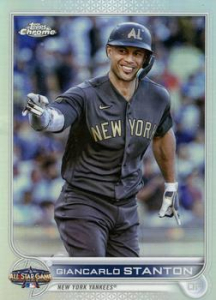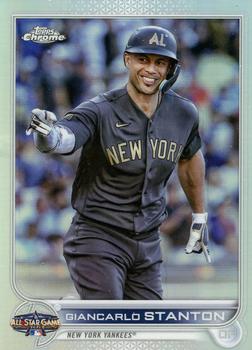July 19, 2022: Dodgers’ unbeaten Gonsolin unable to stop AL from 9th consecutive All-Star win
 Forty-two years after the first major-league baseball All-Star Game was played in Dodger Stadium, the third oldest major-league ballpark still in use (after legendary Fenway Park and Wrigley Field), hosted the 92nd midsummer classic in 2022. Two hometown pitchers, Clayton Kershaw and Tony Gonsolin, played integral roles in the game, although their National League team failed to achieve the outcome they hoped for – a win, to break the American League’s eight-game winning streak.
Forty-two years after the first major-league baseball All-Star Game was played in Dodger Stadium, the third oldest major-league ballpark still in use (after legendary Fenway Park and Wrigley Field), hosted the 92nd midsummer classic in 2022. Two hometown pitchers, Clayton Kershaw and Tony Gonsolin, played integral roles in the game, although their National League team failed to achieve the outcome they hoped for – a win, to break the American League’s eight-game winning streak.
Despite being 60 years old, Dodger Stadium has retained its regal status as one of the classic ballparks in the majors. It easily fit into the classification of “baseball cathedral” that has been attached to several major-league parks over the years. Tucked away in a spacious parkland surrounded by Chavez Ravine and just north of downtown, it had the largest capacity of all big-league stadiums in 2022. Dodger Stadium was no stranger to momentous events, having hosted numerous World Series, concerts, and more in its rich history.
Dodger Stadium was to have hosted the All-Star Game in 2020, but the COVID-19 pandemic forced cancellation of the event.
Dodgers third baseman Justin Turner observed about the upcoming game and his hometown fans, “[The All-Star Game] is long overdue. That energy and that buzz and that atmosphere that is created here, which has a lot to do with our fan base, makes it an exciting place to play.”1
It seemed fitting that Dodgers ace pitcher Kershaw would make his first career All-Star start in his home ballpark. Despite being the league’s premier pitcher from 2011 to 2017, he had never drawn the starting assignment in eight prior selections. In the 2022 regular season, he was having a typical Kershaw season, with a 7-2 record and a 2.13 ERA for the first-place Dodgers.
Much of the attention in the days leading up to the game was focused on Kershaw’s outing, including a potential pitcher/batter matchup with Los Angeles Angels’ two-way star Shohei Ohtani. In a news conference on the day before the game, the usually humble Kershaw offered, “Hopefully, I don’t screw it up too bad.”2 Perhaps he was referring to his past two All-Star Game appearances (2019 and 2015), in which he was charged with the losses.
As good as Kershaw had been in the first half of the season, his teammate Gonsolin was even better. The first-time All-Star could have easily been named the starter instead of Kershaw, since he had fashioned an 11-0 record and a 2.02 ERA in 17 starts. The batting line against him was a stingy .168/.230/.308.
The National League’s AL opponents were headlined by Aaron Judge, who was already projecting to challenge Babe Ruth’s American League home-run record, with 33 home runs and 70 RBIs at midseason. Additionally, Shohei Ohtani was doing his best to repeat his MVP Award season of 2021, with 19 homers and 56 RBIs, while also posting a 9-4 record and a 2.38 ERA.
In only his second major-league season, Tampa Bay Rays lefty Shane McClanahan drew the starting pitcher assignment for the American League. His challenge would be containing a potent NL lineup whose first five batters were Ronald Acuña Jr., Mookie Betts, Manny Machado, Paul Goldschmidt, and Trea Turner.
One of the other novel backstories involved the All-Star Contreras brothers achieving a family milestone. With a 5½-year difference in age, Willson and William Contreras had never played on the same team. They finally got their chance on one of baseball’s biggest stages, when the brothers were in the National League’s starting lineup batting sixth and seventh respectively.
Willson, a catcher with the Chicago Cubs, was making his third All-Star Game appearance, while William was making his All-Star debut as a catcher with the Atlanta Braves. (William’s game appearance was as the designated hitter.) The last time two brothers appeared in the same All-Star Game was 2003. Cincinnati Reds infielder Aaron Boone donned a National League jersey, while his brother Bret, a Seattle Mariners infielder, represented the American League. The last time a pair of brothers started together in an All-Star Game was in 1992, when Sandy Alomar Jr. and Roberto Alomar were both in the American League’s starting lineup.
The day before the game, Ohtani said, “To be able to face [Kershaw] in an All-Star Game in Dodger Stadium isn’t a chance that comes often. I’d like to swing with everything I have.” He said his goal was to hit a home run.3
Before a sellout crowd of 52,518, pregame ceremonies included the celebration of the 100th birthday of Rachel Robinson, Jackie’s wife. Former Dodgers hurler Fernando Valenzuela threw out the first pitch, allowing fans to recall memories of Fernandomania days he had inspired 41 years earlier.
When asked in an on-field interview before the game what he was looking forward to in the game, Ohtani replied in English, “First pitch, first swing. That’s it.”4
Kershaw faced leadoff designated hitter Ohtani to start the game. They had previously opposed each other in eight at-bats in regular season games, with Kershaw holding Ohtani hitless.
On Kershaw’s first pitch to Ohtani, he gave the left-handed hitter the pitch he wanted – a waist-high 91-MPH fastball on which Ohtani delivered a broken-bat, flare single to center field.5 After two pitches to the ominous 6-foot-7 Judge, Kershaw picked off Ohtani at first base and then came back to strike out Judge. After walking Rafael Devers, Kershaw escaped the inning by inducing Vlad Guerrero Jr. to ground out.
Of his pickoff move to get Ohtani out, Kershaw said, “I just kind of lobbed it over there. I didn’t know what pitch to throw yet, so kind of giving myself a second and I got him.” Ohtani went back to his dugout with a smile, acknowledging that Kershaw won their confrontation.6
McClanahan wasn’t as fortunate in his first inning. After Ronald Acuña Jr. led off with a ground-rule double, Betts drove him in with a single. After Machado grounded into a double play, Goldschmidt added another score with a solo home run to deep left-center field.
In the bottom of the second, Blue Jays pitcher Alek Manoah struck out the side, retiring William Contreras, Joc Pederson, and Acuna.
Following relievers Sandy Alcantara and Joe Musgrove, who held the American League scoreless in the second and third innings, Gonsolin yielded a single to José Ramirez to start the fourth inning. After retiring Guerrero on a fly ball, Gonsolin gave up back-to-back home runs to Giancarlo Stanton and Byron Buxton to put the American League ahead 3-2. It was the seventh set of back-to-back home runs in All-Star Game competition.7 8
The remainder of the game was scoreless, marked by only four total hits by both sides. The American League managed three more (by Ramirez, Jose Trevino, and Luis Arraez), while the National League could muster only one more, by Austin Riley in the eighth.
Cleveland Guardians reliever Emmanuel Clase closed out the American League’s victory by striking out the side in the ninth.
The American League collected eight hits while whiffing 12 times. The National League managed five hits, with 10 strikeouts.
Undefeated during the regular season before the All-Star Game, Gonsolin was in unfamiliar territory in absorbing the loss. He had somewhat of an aftereffect in his first start after the All-Star Game when he suffered his first loss of the regular season on July 25. However, he finished the season with a 16-1 record.
Houston Astros pitcher Framber Valdez got credit for the AL win, as he retired the formidable hitting trio of Juan Soto, Manny Machado, and Freddie Freeman on groundballs in the third inning. Giancarlo Stanton was named the game’s Most Valuable Player.
The Contreras brothers failed to contribute offensively to the NL’s cause. Together, they were hitless in three plate appearances. However, the brothers cherished their outing. “Having my brother along my side is a blast,” Willson told reporters. “We got to talk a lot about the game.”9
In claiming its ninth consecutive All-Star Game win, the American League extended its dominance over it counterparts since 1988. During that stretch, the National League had won only six times (2010-2012) and (1994-1996).10
Sources
In addition to the sources cited in the Notes, the author consulted the following:
Montemurro, Meghan. “All-Star Game a Family Affair,” Chicago Tribune, July 13, 2022: Section 3, 3.
baseball-reference.com/allstar/2022-allstar-game.shtml.
retrosheet.org/boxesetc/2022/B07190NLS2022.htm.
Photo credit: Giancarlo Stanton, Trading Card Database.
Notes
1 Jack Harris, “At 60 Years Young, Still Looking Great,” Los Angeles Times, July 17, 2022: V6.
2 Jack Harris, “Kershaw Gets the Nod for the NL,” Los Angeles Times, July 19, 2022: B10.
3 Dylan Hernandez, “Ohtani Gives All Against Kershaw,” Los Angeles Times, July 20, 2022: B10.
4 Hernandez, B6.
5 Hernandez.
6 Hernandez.
7 LaMond Pope, “Sox, Cubs Players Make Some Impact,” Chicago Tribune, July 21, 2022: Section 3, 3.
8 The other six occurrences of back-to-back home runs in All-Star Games are: 1954 (Al Rosen and Ray Boone ), 1956 (Ted Williams and Mickey Mantle), 1975 (Steve Garvey and Jim Wynn), 1989 (Bo Jackson and Wade Boggs), 2001 (Derek Jeter and Magglio Ordóñez), and 2018 (Alex Bregman and George Springer). Baseball Almanac. https://www.baseball-almanac.com/asgbox/all_star_game_home_runs.shtml. Accessed April 29, 2023.
9 Pope, “Sox, Cubs Players Make Some Impact.”
10 The NL dominated between 1960 and 1985, as the AL won only three times (1962 Game Two, 1971, and 1983) in that span.
Additional Stats
American League 3
National League 2
Dodger Stadium
Los Angeles, CA
Box Score + PBP:
Corrections? Additions?
If you can help us improve this game story, contact us.


